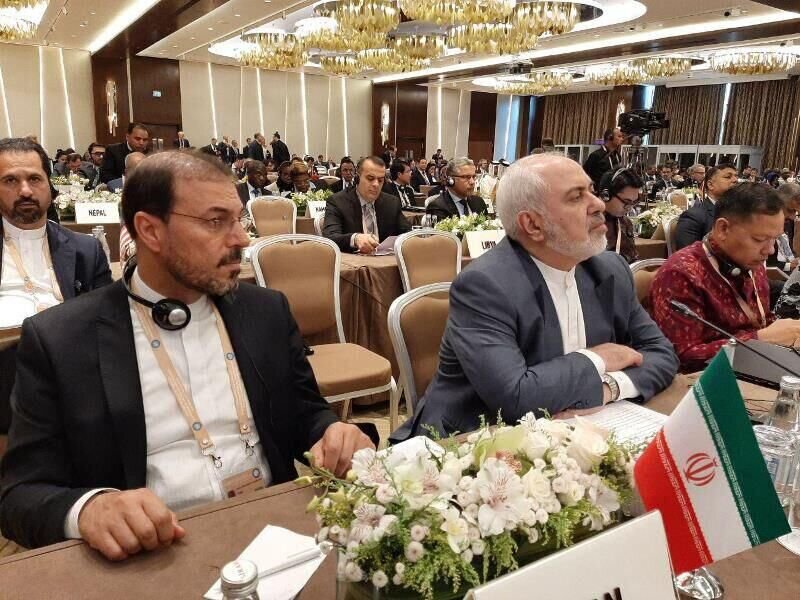U.S. addiction to sanctions is undermining intl. economic relations: Zarif

TEHRAN – Iranian Foreign Minister Mohammad Javad Zarif said on Wednesday that the United States’ addiction to sanctions is undermining the fabric of international economic relations and putting global commerce at risk.
“In fact, the U.S.’ addiction to sanctions—or more correctly economic terrorism—against the people of many non-aligned countries, including Cuba, Venezuela, Syria, Iran and even major powers such as China and Russia, is undermining the fabric of international economic relations, and putting hundreds of millions of people, as well as global commerce, at risk,” he said during a speech at the Non-Aligned Movement (NAM) ministerial meeting in Baku, Azerbaijan.
Following is full text of his speech published by IRNA:
I would like to begin by thanking our neighbors and brethren—the people and government of the Republic of Azerbaijan—for organizing this NAM Summit and for the warm hospitality they have extended to the participants. My gratitude also goes to the Bolivarian Republic of Venezuela for proficiently presiding over our Movement during the past three years.
An escalating contempt for diplomacy, multilateralism and international cooperation has exacerbated the chronic challenges and increased uncertainties around the globe. International law, multilateral agreements, Security Council resolutions, and the norms of civilized behavior are all seemingly being sacrificed for personal political ambitions.
An escalating contempt for diplomacy, multilateralism and international cooperation has exacerbated the chronic challenges and increased uncertainties around the globe. International law, multilateral agreements, Security Council resolutions, and the norms of civilized behavior are all seemingly being sacrificed for personal political ambitions.
West Asia suffers the most from this vendetta against the global order:
The Palestinian right to self-determination, as one of the most important NAM objectives, is being trampled on by unilateral and destructive U.S. policies; particularly by its illegal and dangerous positions on Al-Quds and the Golan. The Zionist regime has been emboldened by the U.S. blind support—and unfortunately also by the short-sighted acquiescence of some in our region—to usurp and absorb more, and even more, of Palestine.
The horrendous atrocities against the people of Yemen, along with the regional ramifications of that war—conducted with full U.S. backing—threaten to spiral out of control and lead to further escalation and insecurity in the region and beyond.
The American economic war—indeed its economic terrorism—targeting ordinary Iranian people and wishfully attempting to starve them into submission—is not just a willful and publicly-announced crime against humanity, but a grave and immediate threat to international peace and security.
The irresponsible action by the U.S. in its withdrawing from the JCPOA—despite Iran’s full adherence to its commitments—has been another major disrupting element in our region and beyond. The American economic war—indeed its economic terrorism—targeting ordinary Iranian people and wishfully attempting to starve them into submission—is not just a willful and publicly-announced crime against humanity, but a grave and immediate threat to international peace and security.
In fact, the U.S. addiction to sanctions—or more correctly economic terrorism—against the people of many non-aligned countries, including Cuba, Venezuela, Syria, Iran and even major powers such as China and Russia, is undermining the fabric of international economic relations, and putting hundreds of millions of people, as well as global commerce, at risk.
There is an urgent need for a unified stance by the international community to compel the U.S. to reverse its dangerous course in order to avert a global catastrophe.
Today, the United States has even proven its propensity to betray its own clients. Many have learned that it is wishful—if not suicidal—to expect the U.S. to provide them protection and support.
But it is our people who are paying the price for the U.S. reckless behavior. As such it is absolutely imperative for the members of our movement to close ranks and engage in collective and innovative thinking—and action—to reverse this course, or at least to reduce its impact on our peoples.
The Hormuz Peace Endeavor (HOPE) that President Rouhani presented at the United Nations this past September is one such effort. It aims to promote dialogue, mutual respect and equal footing, respect for sovereignty, territorial integrity and the inviolability of international borders; peaceful settlement of all disputes; rejection of the threat or use of force; non-aggression and non-intervention in internal or external affairs of each other; and energy security and the free flow of resources.
We again invite our neighbors and all our partners in NAM to work with us to enrich and implement HOPE.
NA/PA
